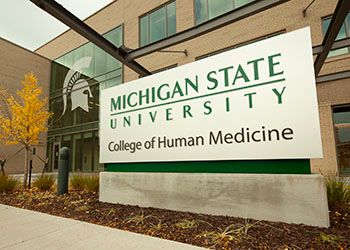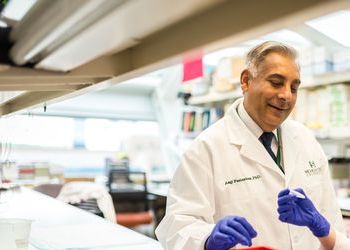Helping Real People by Advancing New Knowledge
Support life-changing Alzheimer's and dementia research
Helping Real People by Advancing New Knowledge
Support life-changing Alzheimer's and dementia research
November 5, 2015Science called out to researcher Nick Kanaan quite some time ago. Its complexity was not simply interesting—there was a mystery surrounding the study of neurodegenerative diseases like Parkinson’s and Alzheimer’s.
Kanaan, now an assistant professor in the Department of Translational Science and Molecular Medicine at MSU’s College of Human Medicine, admits studying the brain was fascinating.
“Neuroscience intrigued me,” Kanaan said. “I quickly began to appreciate how many people these diseases affect, especially Alzheimer’s, which is a profound disease. It’s an important disease that we currently have virtually no capacity to change.”
There is no cure for Alzheimer’s disease or Parkinson’s disease, which affect millions of Americans and their families. While Kanaan admits the diseases he studies are complicated and tricky, hope for finding solutions to slow disease progression does exist.
“Our team has the ability to move things forward in significant ways,” Kanaan said. “When we see something encouraging, it increases our productivity because these discoveries add to new knowledge.”
Knowledge that helps real people: parents, grandparents, sisters, brothers.
Strength in numbers
Kanaan specifically studies tau, a naturally-occurring brain protein, which becomes accumulated and tangled in the brains of Alzheimer’s and dementia patients. The tau protein also contributes to the death of neurons in the brain.
Kanaan was attracted to MSU in part due to his department’s team-based philosophy—which includes researchers, leaders, partners and donors—on science, which is today more relevant than ever.
“One person can’t know or tackle the numerous approaches to studying diseases,” Kannan said. “Our team can approach a problem in a multi-faceted way. It’s the synergy you get between people that helps make significant strides.”
Where the research happens is also critical to the progress Kanaan’s team is making.
Currently, an $88.1 million, six-story Grand Rapids Research Center facility is being built on the site of the former Grand Rapids Press building. Once completed in 2017, Kanaan’s group will be one of 44 research teams studying Alzheimer’s, Parkinson’s, pediatric neurology, autism, women’s health and more.
Motivated to succeed
Private funding is moving Kanaan and his team constantly closer to slowing the progression of disease. With careful research, something unknown today may reveal itself tomorrow, and funding helps the team to arrive at solutions faster.
In fact, it already has.
The results coming out of Kanaan’s lab are encouraging to those philanthropists seeking to support research like Kanaan’s. For instance, last year, the Jean P. Schultz Biomedical Research Endowment offered seed funding to keep Kanaan’s research going, while he waited for a highly competitive $1.8 million NIH grant—which he received.
“To make sure donors are feeling like they’re investing wisely and helping something real and exciting happen, there is ownership in and responsibility for what we’re doing,” Kanaan stressed. “I think it motivates us in a real and powerful way.”
Researchers not only have big ideas, they have a hurdle of funding to cross over—but what if funding wasn’t a barrier?
“This would be the biggest dream come true for a scientist,” Kanaan said with a smile. “Unlimited funding could facilitate hitting on something that could delay the onset of disease for five, maybe ten or fifteen years. There would be profound movement forward.”
The importance of increased private funding has never been more crucial than it is at this point in Michigan State’s history. The time is now to support research coming from Kanaan and his team’s lab.
Learn more about supporting life-changing research like Kanaan’s.
Author: Sarah Wardell



